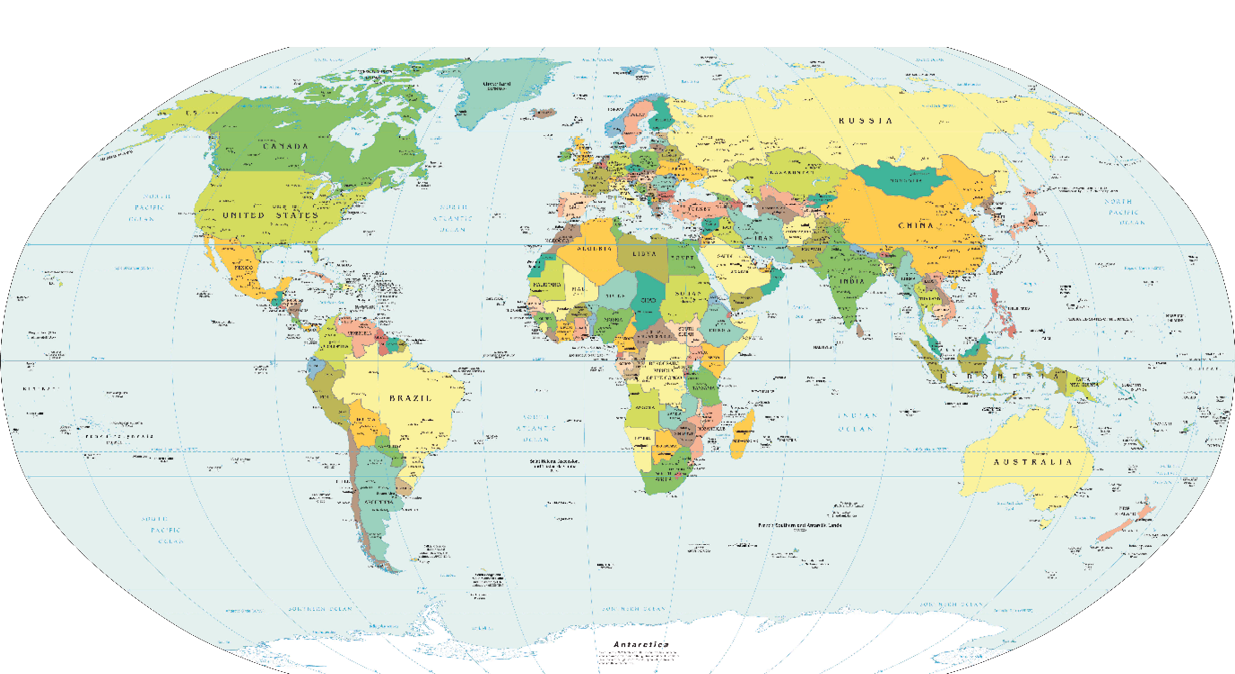
Contemporary political map of the world, public domain, http://www.freemapviewer.com/en/map/Map-World_3.html
Afterthoughts: Walls and Bridges
The question is how to go on from here. The question is how the story will continue. During decolonization, the Europeans were convinced that their way of organizing international politics was the only alternative. They were also convinced that their international system constituted a great improvement on the international systems which previously had existed elsewhere in the world. The European version of an international system allows for sovereignty and self-determination, and thereby for democracy and liberal rights. These, no doubt, are good values and unique achievements. However, learning about non-European alternatives to the European international system, we might nevertheless decide to question that conclusion. Or, if nothing else, we can compare what we have today with what existed before the European international system took over the world.
The fundamental problem of the European system is the mass deaths it causes. The idea of sovereign states who determine their own fates, and look after their own interests without regard for others, has had disastrous consequences. There are few years in Europe’s history of the last four centuries when there has not been a war in one place or another. In the twentieth century alone almost 100 million people perished in wars between sovereign states, and tens of millions more died in genocides which the principles of sovereignty and non-interference made possible. By contrast, several of the non-European international systems we have learned about in this book were less war-prone — although certainly none was peaceful. Moreover, although sovereignty has not been an official principle of an international system anywhere except in Europe, there has in practice been a lot of scope for self-determination. The various political entities of East Asia were independent although, at the same time, they were dependent on the Chinese; the emirs of Central Asia ruled themselves although they all ostensibly were a part of the Abbasid Caliphate; the kings of Southeast Asia were heavily influenced by Indian culture, but India played no role in running their countries. There is no contradiction here, although it might seem that way from a European perspective.
However, perhaps the problems caused by sovereignty are about to go away. Today we are living in a world that is becoming increasingly global. Borders seem to matter less and less; walls are coming down all around us and bridges are being built even between far-away cultures and societies. We are trading and exchanging with each other at an unprecedented rate — swapping goods and services but also ideas and lifestyles. We are all becoming more and more civilized, we could say, while our respective cultures are becoming increasingly alike. As always, and never more so than now, the spread of civilization goes together with widespread cultural destruction.
There are many who worry about such a world — a fully globalized world without walls and cultures, where sovereignty is a thing of the past. How can we make a life for ourselves, they wonder, if we belong to no place in particular and have no unique identity? People who worry about such things often argue that we must rebuild our walls, close our borders, and protect ourselves from what is coming towards us from the outside. Yet the question is what political, economic and social consequences will flow from such a reaction. Will higher walls not lead to more misunderstandings, less trade and more wars? Will we not save our culture, and defend our sovereignty, while losing our civilization?
However, if this book has taught us anything, it is surely that this is a false choice. The choice is not between perfect sovereignty and no sovereignty at all. It is not a choice between walls everywhere and no walls whatsoever, or between being a member of a distinct culture or of a global, uniform civilization. That only appears to be the choice as long as we look at the world from a European point of view. Yet, and as we also have learned, the European international system is actually quite extreme; many other international systems have made compromises that are more appealing. There are all kinds of international institutional arrangements that allow both independence and coordination, a strong sense of self and a strong sense of international community. By learning about these alternatives, we can learn more about which options are available to us. So what is your favorite international system? Was there ever one part of the world, and one time, where the walls were just the right height and the bridges were sufficiently many? Where human beings had a strong sense of a home and yet were perfectly open to the challenges that contacts with foreign cultures allow? A time when people were secure in their identities yet also prepared to question themselves and to change? Was there ever a time when self-determination could be combined with prosperity and peace? By thinking about such questions perhaps we can come up with new ways to imagine our future.

